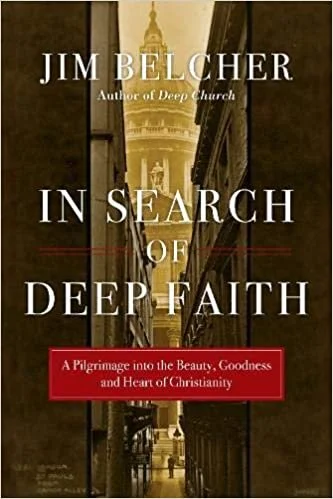In Search of Deep Faith
In 2010, after years of church ministry, Jim Belcher was worn out and spread thin, “like butter, scraped over too much bread,” to use the line from The Lord of the Rings.
So along with his family, he set off for a year in England and Europe, not as a vacation so much as a field trip. They visited important sites in the history of Christianity, while reflecting on the lives and teachings of their spiritual heroes—familiar people like C.S. Lewis, Dietrich Bonhoeffer, Corrie ten Boom, and William Wilberforce, as well as figures like André Trocmé and the villagers of Le Chambon in France, who were equally heroic, though their stories may be less well known.
Never have I read a book quite like In Search of Deep Faith, which chronicles the family’s pilgrimage. Part spiritual memoir, part history, part travel writing, I absolutely love how he weaves it all together.
An underlying theme throughout the book is the commitment Belcher and his wife, Michelle, have to raise their children in a way that will prepare them for what’s to come as they approach their teen and adult years. Repeatedly citing the much-discussed National Study on Youth and Religion, “which found most high-schoolers, even if they grew up in a religious home, were unable to meaningfully articulate their faith.” In Christian Smith and Melinda Denton’s book Soul Searching, which is based on the study’s findings, they coin the now-familiar term Moralistic Therapeutic Deism to describe the religious beliefs of typical church-going youth in North America, who describe their faith in terms of being good people, who primarily aim to be happy in life, while keeping God at arm’s length—not close enough to interfere in daily life, but close enough to intervene when the need arises. Needless to say, this falls far short of orthodox Christian faith.
Concerned about the seeming near-inevitability of MTD, Belcher wonders how to cultivate in his kids a “consequential faith” (to use Kenda Creasy Dean’s term) that will sustain them—a faith that will enable them to deal honestly with doubt, and that will instill in them the virtues needed to act with courage and conviction when doing so isn’t convenient. The family’s spiritual pilgrimage comes to constitute at least part of the answer, and wonderfully so.
The chapter on the French village of Le Chambon provides an unforgettable case in point. The story of the courage and conviction of pastor André Trocmé and his fellow villagers during World War II is told in the book Lest Innocent Blood Be Shed, but to my shame it was new to me. After France had capitulated to Hitler and Germany, the men and women of this Huguenot village risked their lives to provide a safe haven for an estimated 3,000 to 5,000 Jews, who at that point had nowhere left to hide. At a time of barbaric suffering at the hands of the Nazi regime, it has been said that “goodness happened” in Le Chambon, and it was because the conviction and courage of Trocmé and his parishioners had become deeply ingrained virtues, not mere accessories to an already full life. Embodying the sacrificial love of Jesus had become second nature.
In order for any of us to act as the villagers of Le Chambon did under pressure, who risked their lives to protect the lives of others, doing so would have to become second nature for us too. And for it to become second nature, we would need to see these virtues demonstrated in the context of a nurturing community. In other words, spiritual formation and fellowship in church have everything to do with doing justice and loving mercy in the world. You can’t divorce the two without grave consequences.
In Search of Deep Faith is not a comprehensive survey of the most influential Christian figures in history. Rather, it’s limited to those who have most influenced Belcher and his family—and who happened to come from a particular region of the world that the family could afford to visit in a limited amount of time. So I can’t fault him too much for the fact that this pilgrimage was so Eurocentric. Nonetheless, I hope I’d be forgiven for suggesting what a spiritual feast it would be if someone managed to write a book like this—part spiritual memoir, part history, part travel writing—exploring notable figures from the rich history of Christianity elsewhere around the world, particularly in the Middle East, where the faith began, as well as Africa, Asia, and Latin America, where fellow believers are reshaping the twenty-first century before our very eyes. (But we can’t ask Belcher do to everything; maybe I’ll just have to write it some day!)
One concluding lesson from this book that I’ll carry with me comes from the chapter on Dietrich Bonhoeffer, who as we all know was ultimately killed by the Nazis, while so many other clergy in Germany embraced (begrudgingly or not) the nationalistic and racist ideology of Hitler’s regime. Like the villagers of Le Chambon, Bonhoeffer’s character had been cultivated through liturgical practices and deep community, both of which are instructive for us today.
But there was something else especially evident in Bonhoeffer’s life right up until the end. It was his eschatological imagination, biblically informed, which gave him eyes to see beyond a shadow of a doubt that Hitler and the Third Reich wouldn’t have the last word. The day is coming, he knew, when sin and death would be no more.
That hope sustained him then. That hope can sustain us still.
